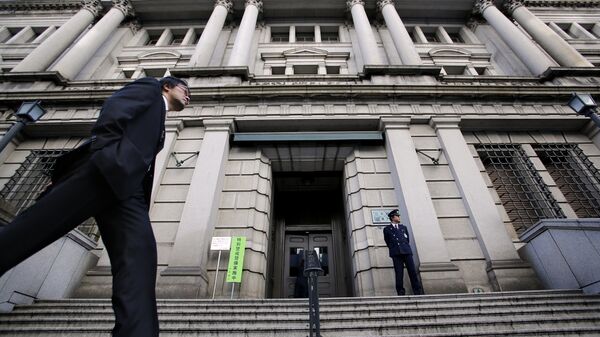Kristian Rouz – Bank of Japan (BOJ) Governor Haruhiko Kuroda says he and his fellow policymakers will sit down this week to discuss the possible negative effects of overseas economic developments on Japan's economy. The discussions come amid mounting disagreement between Kuroda and Prime Minister Shinzo Abe over the BOJ's price targeting.
In a speech before Japanese parliament on Tuesday, Kuroda said the central bank would consider a further cut to borrowing costs into negative territory, during its upcoming rates discussion.
A majority of economists now see the Bank of Japan expanding stimulus as its next move https://t.co/QfGam1ssUd
— Bloomberg (@business) 16 июня 2019 г.
An actual rate cut is considered unlikely in the coming days, although it could be in place by year's end. This time, BOJ policymakers are expected to focus mainly on the spillover effects of the US-China trade tensions on Japan's foreign trade and manufacturing.
“As for recent overseas economic developments, there are strong downside risks regarding the Sino-US trade friction and China’s economy,” Kuroda said. “We’ll certainly debate such overseas developments.”
The BOJ governor pointed out that the central bank has already provided significant accommodation to the Japanese economy starting in 2013, by supporting commercial lending with ultra-low interest rates and aiding business activity with a massive bond-buying programme.
His remarks come amid reports of conflicting views held by Kuroda and Abe on the BOJ's inflation target. Currently set at 2-per cent, the target has proven hard to achieve.
(Research Paper) Rebasing of the Services Producer Price Index to the Base Year 2015 https://t.co/Sn1QhRc0Ik
— Bank of Japan (@Bank_of_Japan_e) 18 июня 2019 г.
Japan is excessively reliant on imports of fuel, food, and raw materials. While the BOJ's stimulus has weighed in on the yen's FX rate, which in turn has supported domestic price growth, the yen's reserve currency status has bolstered its FX rate during times of economic turmoil elsewhere.
As a result, the yen tends to appreciate in times of economic uncertainty, rendering imported goods cheaper and thus weighing in on domestic inflation in Japan.
From sushi robots to farm drones: How Japan Inc’s innovation thwarted the Bank of Japan’s efforts to reflate the economy https://t.co/Fyj7RBscvv by Kaori Kaneko @Reuters pic.twitter.com/xAiQz1QELV
— Reuters Top News (@Reuters) 17 июня 2019 г.
Abe, who initially welcomed Kuroda's 2-per cent inflation target back in 2013, has become increasingly frustrated with the central bank's inability to achieve it in recent months. The Prime Minister has come to the conclusion that monetary policies alone are not enough to reach sustainable inflation and ensure stable GDP growth and is now urging measures aimed at job creation.
"It's true the BOJ has yet to hit its 2% inflation target," Abe said. "But the real purpose of having this target is to create jobs and achieve full employment. In that sense, I think monetary policy has achieved its purpose."
Some economists are saying that the 2-per cent target has become redundant, and the BOJ might better focus on supporting business activity. Expediating the creation of jobs would theoretically boost consumer confidence and thus support the natural growth of prices on consumer goods, which in turn would lift throughput costs in other sectors of the economy and support growth in disposable incomes.
As a result, the BOJ would eventually be able to raise borrowing costs and start normalising its monetary policies.
"I think it (inflation target) can be abandoned. It isn't absolutely crucial," Koichi Hamada, Abe's economic adviser, said. "Prices don't need to rise much. From the perspective of people's livelihood, what's more, desirable is for prices to fall, not rise."
However, Kuroda appears to believe the BOJ hasn't exhausted all its stimulative firepower yet. His most recent remarks reflect his confidence in the negative interest rates regime (NIRP), which, despite having possible hazardous side-effects in terms of debt accumulation, could provide long-term momentum to Japan's GDP expansion.
BOJ Governor Haruhiko Kuroda says the central bank can deliver more big monetary stimulus if necessary, but needs to take care with its side effects on the financial system https://t.co/1Ci43rLl9V pic.twitter.com/j8Pn6jVV9B
— Bloomberg (@business) 10 июня 2019 г.
Kuroda also stressed the BOJ's inflation target policy still stands.
“The BOJ will guide monetary policy appropriately taking into account the impact overseas economic changes could have on Japan’s economic outlook and the momentum for achieving our inflation target,” Kuroda said.
The BOJ will make its decision on interest rates in the coming days, and while some economists believe the rates could be cut, many suggest Kuroda is likely to wait and see whether the US Federal Reserve cuts its rates anytime soon and if global tensions will actually impact the Japanese economy.
So far, the BOJ appears to lack sufficient evidence thereof.



